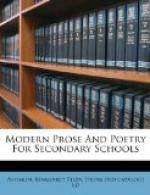These delightful people are old friends of mine, Francois Laguerre and his wife and their only child Lucette. They have lived here for nearly a quarter of a century. He is a straight, silver-haired old Frenchman of sixty, who left Paris, between two suns, nearly forty years ago, with a gendarme close at his heels, a red cockade under his coat, and an intense hatred in his heart for that “little nobody,” Napoleon III.
If you met him on the boulevard you would look for the decoration on his lapel, remarking to yourself, “Some retired officer on half pay.” If you met him at the railway station opposite, you would say, “A French professor returning to his school.” Both of these surmises are partly wrong, and both partly right. Monsieur Laguerre has had a history. One can see by the deep lines in his forehead and by the firm set of his eyes and mouth that it has been an eventful one.
His wife is a few years his junior, short and stout, and thoroughly French down to the very toes of her felt slippers. She is devoted to Francois and Lucette, the best of cooks, and, in spite of her scoldings, good-nature itself. As soon as she hears me calling, there arise before her the visions of many delightful dinners prepared for me by her own hand and ready to the minute—all spoiled by my belated sketches. So she begins to scold before I am out of the boat or in it, for that matter.
Across the fence next to Laguerre’s lives a confrere, a brother exile, Monsieur Marmosette, who also has a shop in the city, where he carves fine ivories. Monsieur Marmosette has only one son. He too is named Francois, after his father’s old friend. Farther down on both sides of the narrow stream front the cottages of other friends, all Frenchmen; and near the propped-up bridge an Italian who knew Garibaldi burrows in a low, slanting cabin, which is covered with vines. I remember a dish of spaghetti under those vines, and a flask of Chianti from its cellar, all cobwebs and plaited straw, that left a taste of Venice in my mouth for days.
As there is only the great bridge above, which helps the country road across the little stream, and the little foot-bridge below, and as there is no path or road,—all the houses fronting the water,—the Bronx here is really the only highway, and so everybody must needs keep a boat. This is why the stream is crowded in the warm afternoons with all sorts of water craft loaded with whole families, even to the babies, taking the air, or crossing from bank to bank in their daily pursuits.
There is a quality which one never sees in Nature until she has been rough-handled by man and has outlived the usage. It is the picturesque. In the deep recesses of the primeval forest, along the mountain-slope, and away up the tumbling brook, Nature may be majestic, beautiful, and even sublime; but she is never picturesque. This quality comes only after the axe and the saw have let the sunlight into the dense tangle and have




